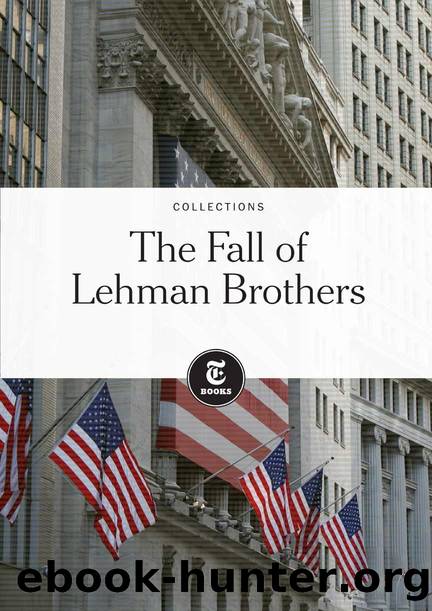The Fall of Lehman Brothers by The New York Times

Author:The New York Times
Language: eng
Format: azw3
Tags: Banking, BUSINESS &, ECONOMICS/Banks &
Publisher: The New York Times Company
Published: 2015-03-22T16:00:00+00:00
Opinion: Wall Street Whitewash
By PAUL KRUGMAN
December 16, 2010
When the financial crisis struck, many people â myself included â considered it a teachable moment. Above all, we expected the crisis to remind everyone why banks need to be effectively regulated.
How naïve we were. We should have realized that the modern Republican Party is utterly dedicated to the Reaganite slogan that government is always the problem, never the solution. And, therefore, we should have realized that party loyalists, confronted with facts that donât fit the slogan, would adjust the facts.
Which brings me to the case of the collapsing crisis commission.
The bipartisan Financial Crisis Inquiry Commission was established by law to âexamine the causes, domestic and global, of the current financial and economic crisis in the United States.â The hope was that it would be a modern version of the Pecora investigation of the 1930s, which documented Wall Street abuses and helped pave the way for financial reform.
Instead, however, the commission has broken down along partisan lines, unable to agree on even the most basic points.
Itâs not as if the story of the crisis is particularly obscure. First, there was a widely spread housing bubble, not just in the United States, but in Ireland, Spain, and other countries as well. This bubble was inflated by irresponsible lending, made possible both by bank deregulation and the failure to extend regulation to âshadow banks,â which werenât covered by traditional regulation but nonetheless engaged in banking activities and created bank-type risks.
Then the bubble burst, with hugely disruptive consequences. It turned out that Wall Street had created a web of interconnection nobody understood, so that the failure of Lehman Brothers, a medium-size investment bank, could threaten to take down the whole world financial system.
Itâs a straightforward story, but a story that the Republican members of the commission donât want told. Literally.
Last week, reports Shahien Nasiripour of The Huffington Post, all four Republicans on the commission voted to exclude the following terms from the report: âderegulation,â âshadow banking,â âinterconnection,â and, yes, âWall Street.â
When Democratic members refused to go along with this insistence that the story of Hamlet be told without the prince, the Republicans went ahead and issued their own report, which did, indeed, avoid using any of the banned terms.
That report is all of nine pages long, with few facts and hardly any numbers. Beyond that, it tells a story that has been widely and repeatedly debunked â without responding at all to the debunkers.
In the world according to the G.O.P. commissioners, itâs all the fault of government do-gooders, who used various levers â especially Fannie Mae and Freddie Mac, the government-sponsored loan-guarantee agencies â to promote loans to low-income borrowers. Wall Street â I mean, the private sector â erred only to the extent that it got suckered into going along with this government-created bubble.
Itâs hard to overstate how wrongheaded all of this is. For one thing, as Iâve already noted, the housing bubble was international â and Fannie and Freddie werenât guaranteeing mortgages in Latvia. Nor were they guaranteeing loans in commercial real estate, which also experienced a huge bubble.
Download
This site does not store any files on its server. We only index and link to content provided by other sites. Please contact the content providers to delete copyright contents if any and email us, we'll remove relevant links or contents immediately.
Pale Blue Dot by Carl Sagan(3995)
The Rules Do Not Apply by Ariel Levy(3897)
Goodbye Paradise(2948)
Delivering Happiness by Tony Hsieh(2917)
Liar's Poker by Michael Lewis(2804)
Into Thin Air by Jon Krakauer(2695)
Purple Cow by Seth Godin(2693)
Ogilvy on Advertising by David Ogilvy(2676)
Rogue Trader by Leeson Nick(2469)
The Airbnb Story by Leigh Gallagher(2363)
The Social Psychology of Inequality by Unknown(2304)
The Mind Map Book by Tony Buzan(2074)
Six Billion Shoppers by Porter Erisman(1995)
Bossypants by Tina Fey(1982)
Claridge's: The Cookbook by Nail Martyn & Erickson Meredith(1958)
All the President's Men by Carl Bernstein & Bob Woodward(1955)
Master of the Game by Sidney Sheldon(1875)
Alibaba by Duncan Clark(1751)
Wild Ride by Adam Lashinsky(1655)
